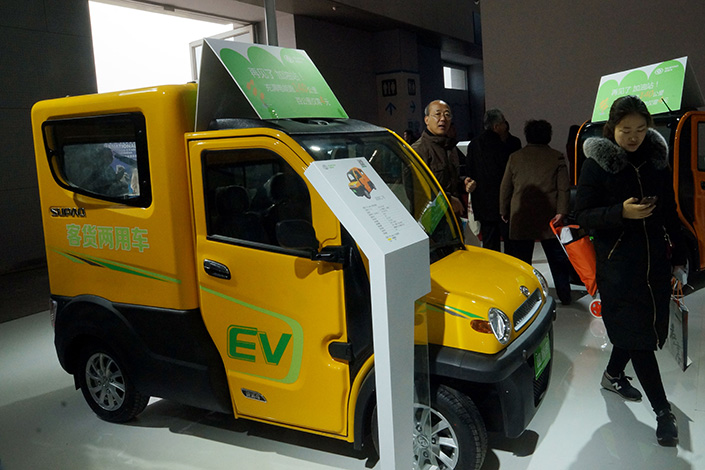China Sticks to Its Guns on Electric-Vehicle Quotas Despite Foreign Squeals

(Beijing) — China has largely left intact an earlier plan to encourage more clean-energy car production, according to a new draft proposal, despite earlier protests from German automakers that complained that the targets would be difficult to meet.
A new version of the plan published on Tuesday by the Legislative Affairs Office of the State Council gave quotas of 8%, 10% and 12% for car producers under the program for the years 2018, 2019 and 2020 respectively. The percentages are derived from complex calculations related to emissions levels for each manufacturer’s total car output in a given year, but are not a direct percentage of its total vehicles that are new-energy cars.
Those three percentages are unchanged from an original draft of the plan published in September, which had been opposed by German automakers that said the quotas would be difficult to meet. The latest draft included some changes to the way that points are calculated. Points under the new system would also be tradable, allowing companies that surpassed their respective quotas to sell some of the excess amount to others that fell short of their targets.
A source at the Ministry of Industry and Information Technology (MIIT), which oversees new-energy vehicles, told Caixin in March that adjustments were being planned but did not elaborate. Reuters reported last week that China had agreed to delay implementation of the system until 2019, responding to concerns by the German automakers.
The issuance of a second draft proposal and period for comment are relatively uncommon and indicate the process hasn’t reached a conclusion yet, a source at the Legislative Affairs Office told Caixin.
In possible anticipation of the difficulties they may face, German giant Volkswagen AG recently formed a new joint venture to produce electric vehicles starting next year, a source close to its new partner Anhui Jianghuai Automobile Co. Ltd. (JAC) told Caixin last month. And last week, Daimler AG signed an agreement to make electric cars in China with its local partner, BAIC Motor Corp.
The latest program is part of China’s broader efforts to promote clean-energy transport and power sources in a bid to clean up the nation’s polluted air and develop cutting-edge technologies that can someday be exported. As part of that push, China is aiming to reach annual new-energy car sales, which includes both pure electric and hybrid cars, by 2020.
Contact reporter Yang Ge (geyang@caixin.com)

- 1Cover Story: China Carves Out a Narrow Path for Offshore Asset Tokenization
- 2Drownings Shake Chinese Enthusiasm for Travel to Russia
- 3Over Half of China’s Provinces Cut Revenue Targets
- 4Li Ka-Shing’s Port Empire Hit by Forced Takeover Amid Panama Legal Dispute
- 5In Depth: China’s Mutual Fund Industry Faces Overhaul After a Banner 2025
- 1Power To The People: Pintec Serves A Booming Consumer Class
- 2Largest hotel group in Europe accepts UnionPay
- 3UnionPay mobile QuickPass debuts in Hong Kong
- 4UnionPay International launches premium catering privilege U Dining Collection
- 5UnionPay International’s U Plan has covered over 1600 stores overseas






